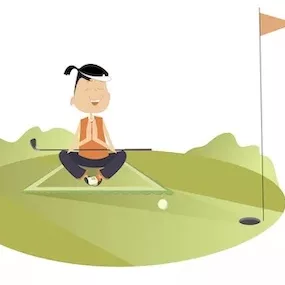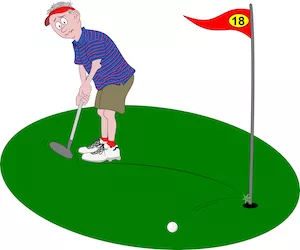Golf is often viewed as a leisurely sport, reserved for those who enjoy the outdoors and a slow-paced game. Whether you are an avid golfer or a beginner looking to try something new, the health benefits of playing golf explained should provide valuable insight into the many ways golf helps positively impact your health.
Good Exercise.

Playing golf, even as a leisurely sport, can be good physical exercise.
Walking: Golfers typically walk several miles during a round of golf, which provides a good low-impact cardiovascular workout. Walking is also beneficial for improving overall leg strength and endurance. Golf courses are often hilly or have uneven terrain, which can increase the intensity of the workout and provide additional challenges for balance and coordination.
Swinging: The act of swinging a golf club involves engaging a variety of muscles, including those in the arms, shoulders, back, and core. This can help improve strength, flexibility, and coordination.
Carrying clubs: Carrying a golf bag, or even pushing a cart, over a large outdoor course can provide a moderate workout for the upper body and core.
Be in the Great Outdoors.
When you play a round of golf, you’ll spend that time outside in the fresh air with these health benefits of golf.

Vitamin D: Research suggests that moderate exposure to natural sunlight can have numerous health benefits. Sun exposure triggers the body to produce Vitamin D, which is essential for bone health and may reduce the risk of several chronic diseases. Sunlight can also improve mood, regulate the body’s internal clock, and promote better quality sleep.
Stress relief: Being outdoors in natural settings, such as a golf course, can reduce stress and improve mood. The fresh air and greenery can be calming and help to promote relaxation.
Mental stimulation: Golf is a challenging game that requires mental focus and strategic thinking. Playing golf outdoors can provide mental stimulation and help to improve cognitive function, mental alertness and memory.
Learn more about the mental game of golf and how you can improve your game
Make New Friends.
Playing golf provides ample opportunities to meet new people and make new friends.
Golfing with others: Golf is often played with others, and this provides a great opportunity to meet new people. Whether playing with a group of friends or being paired up with strangers on the course, there are plenty of opportunities to strike up a conversation and get to know others.
Socializing at the clubhouse: Many golf courses have clubhouses where golfers can socialize before or after a round of golf. This provides an opportunity to meet other golfers, share stories, and make new friends.
Joining a golf league or club: Joining a golf league or club is a great way to meet other golfers who share a common interest. These groups often organize regular events, tournaments, and social activities, providing ample opportunities to make new friends.
Challenge Yourself.
Playing golf can be a challenging and rewarding experience with mental health benefits.
Mental focus: Golf requires a high degree of mental focus and concentration. Players must stay focused on each shot, block out distractions, and maintain a positive mindset throughout the game.
Perseverance: Golf is a difficult sport, and players often face challenges such as difficult shots, bad weather conditions, and tough competitors. By persevering through these challenges, players can develop a strong sense of determination and grit that can be applied to other areas of life.
Strategic thinking: Golf is a sport that requires strategic thinking and decision-making. Players must analyze the course, consider the wind and weather conditions, and make informed decisions about which clubs to use and how to approach each shot. This can help develop problem-solving skills and improve decision-making abilities that can be applied to other areas of life.
Build Character.

Lessons learned on the golf course can have a lasting impact on your personal growth and development.
Integrity: Golf is a sport that relies heavily on honesty and integrity. Players are expected to keep their own score, avoid cheating, and call penalties on themselves if they break the rules. By following these expectations, golfers can build a strong sense of personal integrity and respect for the game.
Patience: Golf is a sport that requires patience and persistence. Players often have to wait for their turn, navigate through challenges on the course, and work through frustrating shots. By learning to be patient and persevere through adversity, golfers can develop important life skills that apply beyond the golf course.
Sportsmanship: Golf is a sport that values sportsmanship and respect for others. Players are expected to be courteous to their fellow competitors, and to show respect for the course and the game itself. By embodying these values, golfers can become more gracious in victory and more resilient in defeat.
Focus: Golf requires a great deal of mental focus and concentration. Players must learn to stay present in the moment and focus on each shot, rather than getting distracted by outside factors. By developing these mental skills, golfers can become more disciplined, gain self esteem, and better able to handle stress in other areas of life.
Whole Family Activity.
Playing golf can be an enjoyable activity for the whole family, regardless of age or skill level. By providing an opportunity for socializing, physical activity, learning, and outdoor recreation, golf can be a great way to strengthen family bonds and create lasting memories.
Accessibility: Golf courses typically offer a range of tee boxes and difficulty levels, making it easy for players of all ages and skill levels to enjoy the game. Some courses even offer family-friendly tees or shorter holes designed specifically for kids or beginners.
Learning opportunities: Golf provides a range of learning opportunities for players of all ages. Kids can learn about sportsmanship, etiquette, and strategy, while adults can improve their skills and knowledge of the game.
Improve Business Relationships.
Playing golf can be a great way to improve business relationships. By networking, finding common ground, improving communication skills, and learning valuable social skills, golf can be a powerful tool for professional development and growth.
Networking: Golf is often played in a business context, and it provides an opportunity to meet and socialize with potential clients, partners, and colleagues. By spending time together on the golf course, players can develop personal connections and build stronger relationships with others in the business community.
Common ground: Golf is a common interest among many professionals, and it can provide a shared experience that can help break down barriers and build trust. Players can develop a sense of camaraderie and shared purpose that can translate into stronger business relationships.
Communication: Golf is a sport that requires good communication and collaboration between players. By working together on the golf course, players can develop better communication skills and learn to work effectively as a team. This can translate into improved communication and collaboration in a business context as well.
Improves Heart Health. Playing golf is good for your heart.

A 2016 study published in the British Journal of Sports Medicine found that golfers who walked the course and carried their own clubs had significantly lower levels of blood pressure, body mass index (BMI), and resting heart rate compared to those who used a golf cart (source).
Another study published in the American Journal of Cardiology in 2010 found that golfers who walked a 9-hole course burned an average of 721 calories, and those who walked an 18-hole course burned an average of 1,442 calories. The study also found that golfers who walked the course had lower levels of total cholesterol and triglycerides, which are risk factors for heart disease. (source)
Low Risk Sport
Compared to many other sports and physical activities, golf is generally considered to be a low-risk activity for injuries.
Low-Impact: Golf is a low-impact sport that involves walking and swinging a club. This reduces the risk of high-impact injuries, such as concussions, broken bones, and sprains.
Non-Contact: Golf is a non-contact sport, meaning that there is no physical contact between players. This reduces the risk of injuries related to collisions or contact with other players.
Controlled Environment: Golf is typically played on a well-maintained course that is free from hazards, such as rocks, holes, and uneven terrain. This reduces the risk factors of tripping, slipping, or falling.
Reduces Stress and Anxiety
Playing golf can be an enjoyable and effective way to manage stress and anxiety. By providing an opportunity for physical activity, socialization, and mental focus in a natural setting, golf can help to promote relaxation and improve overall well-being.
Outdoor Setting: Golf is often played in a peaceful, natural environment, which can be calming and soothing. The fresh air, greenery, and open spaces can help to reduce stress and improve mood.
Physical Activity: Golf involves physical activity, which can release endorphins and improve overall well-being. Exercise is an effective way to reduce stress and anxiety.
Socialization: Golf is often played with others, providing opportunities for socialization and camaraderie. Socializing with others can help to reduce stress and improve mood.
Improves your vision
There is some evidence to suggest that playing golf can help to improve vision in certain ways. Some studies have found that participating in physical activities like golf can help improve overall eye health by increasing blood flow and oxygen to the eyes, reducing the risk of eye diseases such as age-related macular degeneration (AMD) and glaucoma. Additionally, spending time outdoors playing golf or other outdoor activities can also help reduce the risk of nearsightedness, also known as myopia.
Eye-hand coordination: Golf requires good eye-hand coordination, which involves the ability to process visual information and coordinate movement in response. Practicing eye-hand coordination through golf may improve visual-motor skills that can transfer to other activities.
Depth perception: Golf requires accurate depth perception, which is the ability to judge distances and perceive the relative position of objects in space. Practicing depth perception through golf may improve the ability to judge distances in other areas of life, such as driving.
Visual acuity: Golf involves tracking a small ball moving at high speeds over long distances, which can require good visual acuity. Practicing visual acuity through golf may improve the ability to see small details and distinguish between different shades of color.
